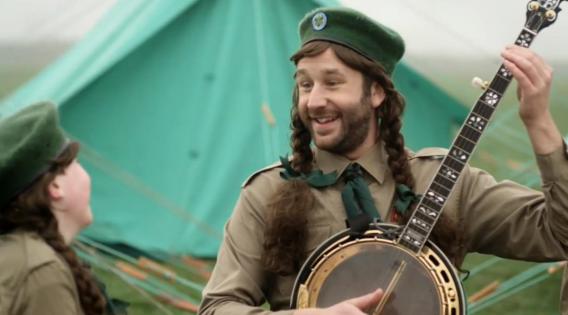Talking With Chris O’Dowd About His Very Irish, Very Feminist New Sitcom

Hulu
Moone Boy, the sweet, hilarious, and utterly charming story of 12-year-old Martin Moone’s coming of age in a small town in the west of Ireland in the late 1980s, arrives on Hulu today. It was co-written by Chris O’Dowd (Family Tree, Girls), who also stars as Martin’s (David Rawle) imaginary friend Sean Murphy. O’Dowd spoke with Slate about the show, the first episode of which can be found at the bottom of this post.
Slate: How much of Moone Boy is autobiographical? I can’t help noticing that you’re from the same town and would’ve been 12 at about the same time as young Martin.
Chris O’Dowd: Everything that’s very funny happened, and I wrote all the filler.
In truth, I think that all of the stories have some kind of basis in reality. Obviously, the kid is very much based on me as a kid—the same three sisters, my parents did the same thing at that time. That’s all very similar. But I didn’t have an imaginary friend, because there was no room in our house.
Slate: It’s an incredibly feminist story—Martin’s mother is a strong supporter of Mary Robinson’s presidential campaign; his sisters have very strong personalities.
O’Dowd: My house was a feminist stronghold, and in a way, I’m not writing about Ireland, I’m writing about personal experience. I was always surrounded by strong women. Also, I am conscious of the fact that women are so badly served in comedy most of the time, so I wanted to make sure that the show we wrote had strong female characters.
Slate: It’s also set in a time when Ireland is changing a lot. It seems like Martin’s life will be very different from his dad’s. Did you consciously choose a time of transition in Ireland’s history?
O’Dowd: I was definitely conscious of that, but as much as it’s different for Ireland, I think it was an age of huge transition for all kids, because it’s pre-mobile phones, pre-Internet, and all that stuff. We decided that we wanted to do a show with a kid at the center before we decided that we wanted to do a period show. I realized that if we were going to do a show about kids, I wouldn’t know how to write them now, with their iPads and their Twitter. I suppose I sound like a very old man, but that kind of upbringing feels very alien to me. My upbringing was pretty rural. I think we had it easier.
Slate: Do you worry that American viewers won’t get some of the references? It feels like you made a show for Irish viewers, knowing that people in other countries might miss some things—rather than making a generic international show.
O’Dowd: I thought it was very important to make a very specific show. All the great stuff is specific. There are moments when I’m conscious of the fact that a British audience, or in particular an American audience, won’t get a reference or a joke that we’re writing, and I just make myself not care. Audiences are forgiving.
Slate: I know that most of your TV work in the U.S. has been on HBO, where there are no restrictions on language, but it’s striking to me that because of the profanity, Moone Boy, which is about a 12-year-old boy, probably couldn’t air on U.S. network television.
O’Dowd: I don’t think there is much swearing. Feck is a big bone of contention with people—to me, that’s just not a swear word. Our priests say feck. I looked into the etymology of the word, and it doesn’t have any connection with the word fuck.
Shit is harder to explain.
With something like this, you have to be self-censoring, and I felt that as long as I would be happy for the kid in the show to watch the show, then it was OK.
Slate: As Sean the imaginary friend says early on, Martin is “an idiot boy,” but he’s also very sweet. You need to be a little bit harsh to be funny, so how did you manage to find a tone that’s also kind?
O’Dowd: I think we get away with a little bit more because it’s very clear that he’s a version of me. Even less discerning viewers realize that I’m taking the piss out of myself. But we love the kid, we love this character, and the show loves the character. It might poke fun at him, but it never ridicules him in any way. He’s always the hero, but I think heroes have to be flawed. He’s an idiot, he can’t help it.
Slate: He’s also incredibly creative. I was very impressed with how you incorporated his hyperactive imagination into the show. He’s always drawing and making up stories. Did you also draw when you were a kid?
O’Dowd: Yes, a lot. There was a lot of art in our house. Like in the show, my father was a sign-writer, so there were always sketches and so on around the house. In real life I was disappointed, because I was never a good drawer. I used my huge powers here to make myself a better drawer.
Slate: You’ve been in so much recently—apart from this, which you’re also co-writing, you’ve been in Family Tree, Girls, a bunch of movies. What’s the secret of your productivity?
O’Dowd: I cut out exercise. I found that that just freed up a lot of my time. I’m very productive, but my arteries won’t last past 40.

